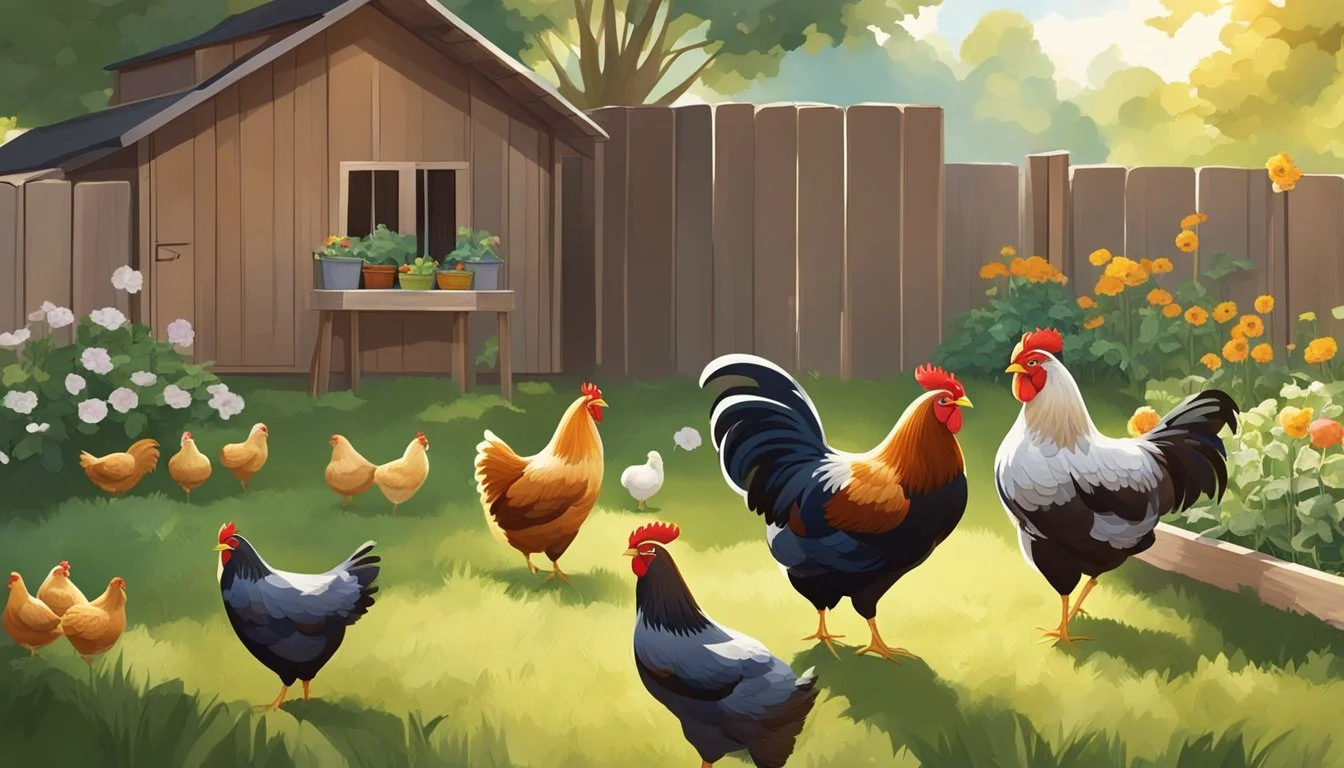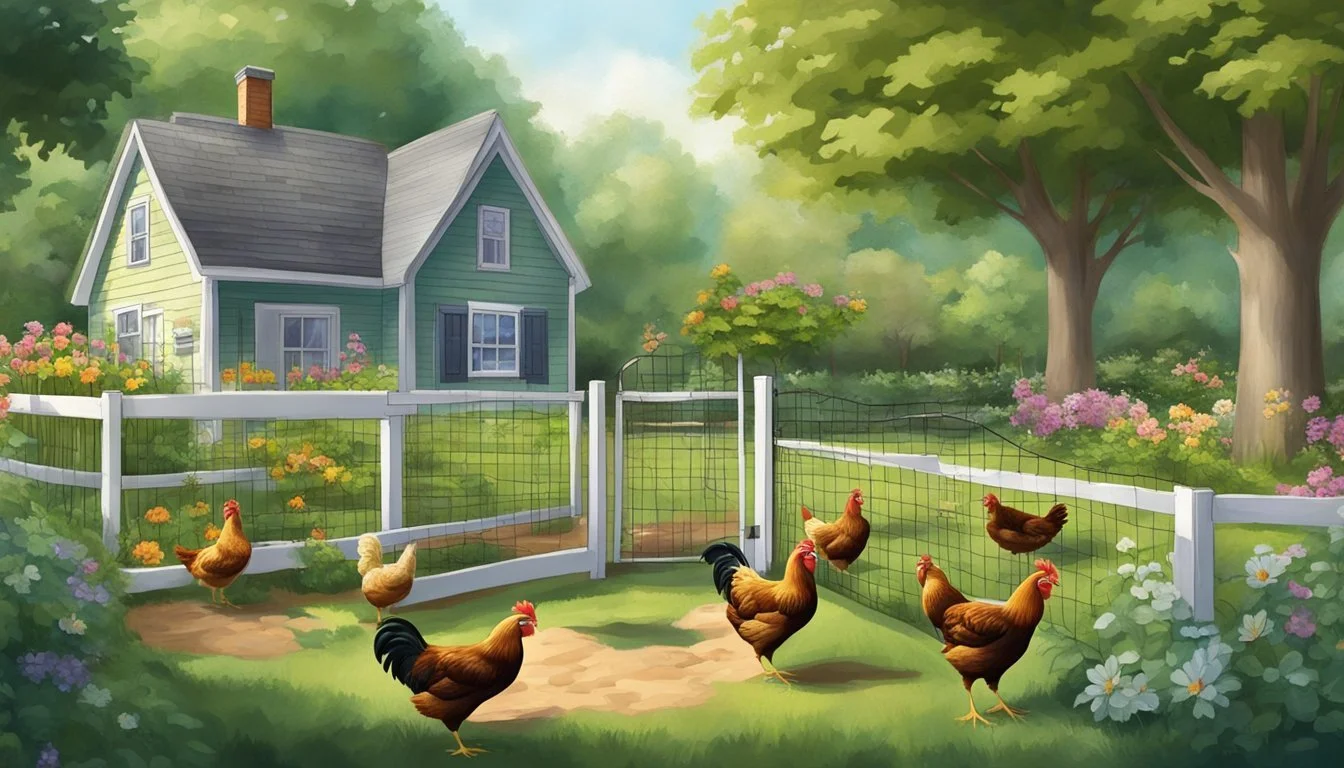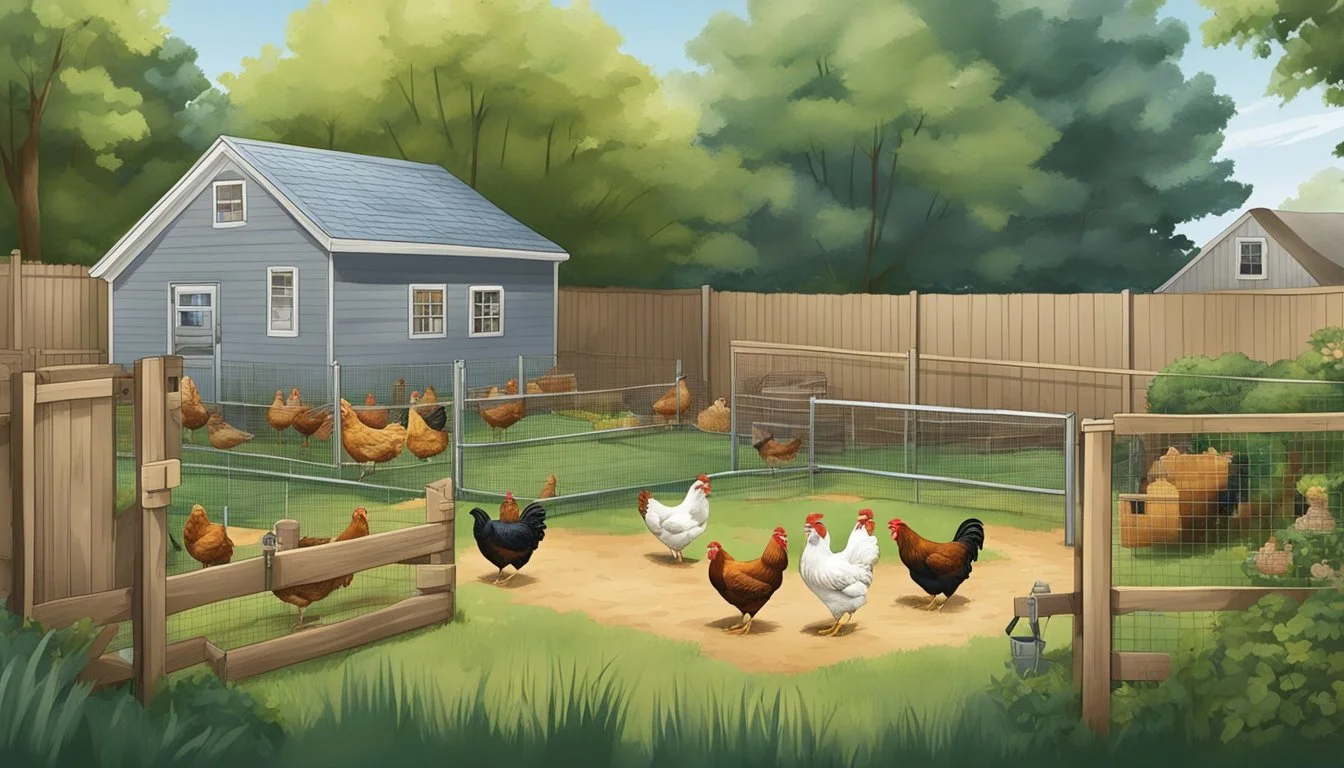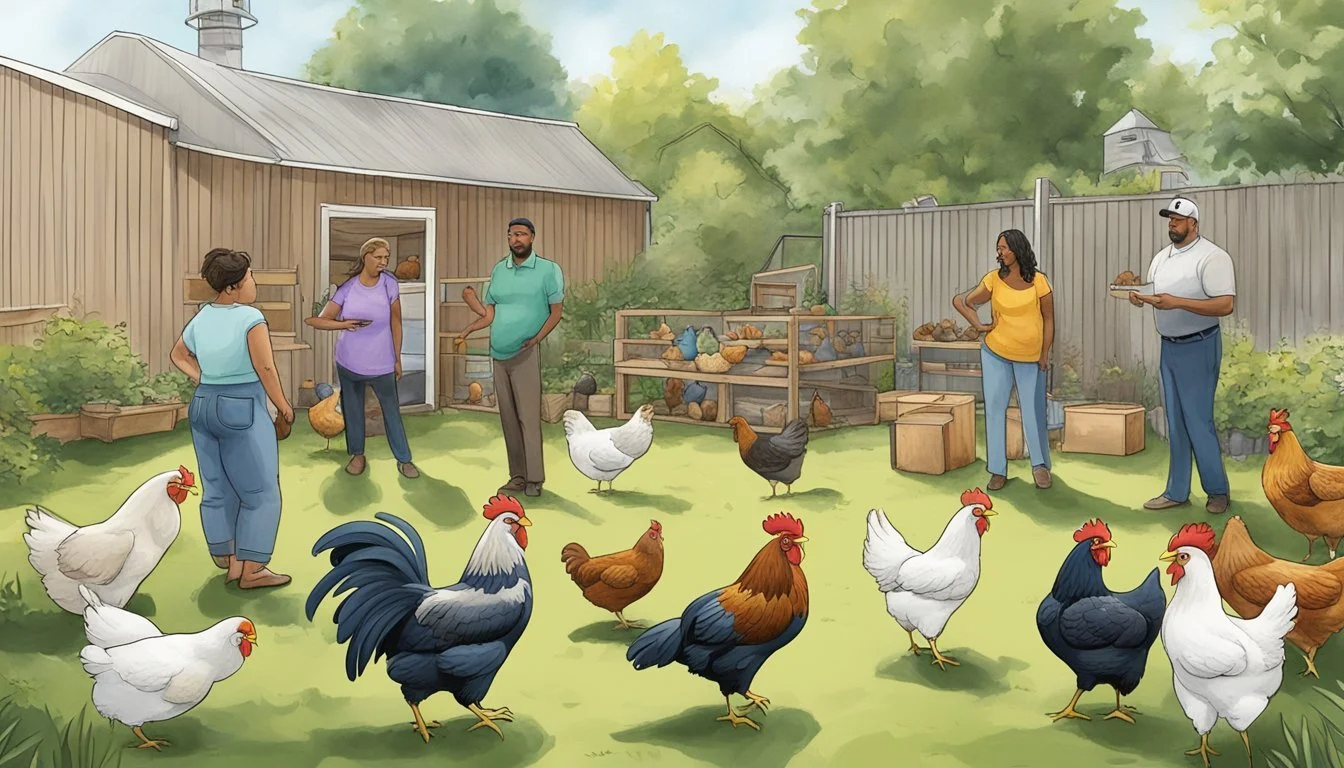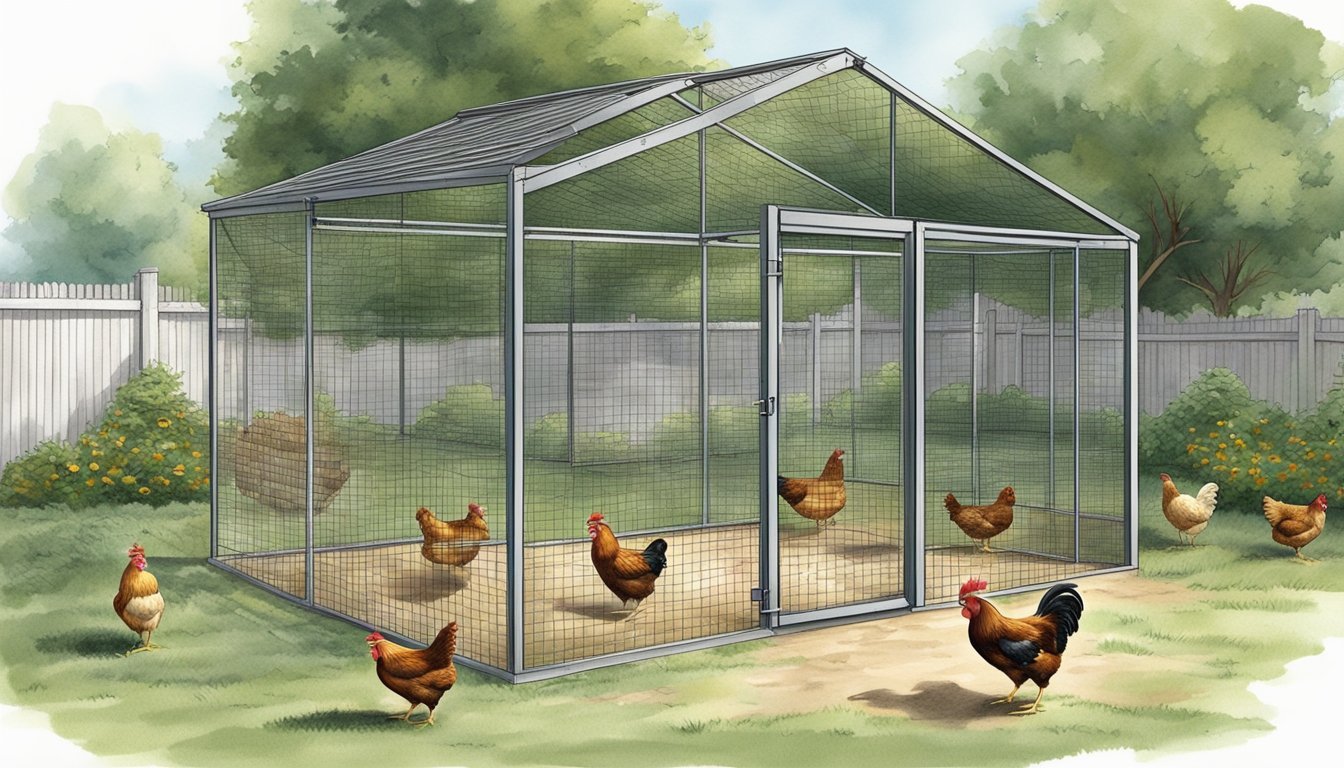Keeping Backyard Chickens in Chesapeake, VA
Essential Tips for Successful Poultry Rearing
Keeping backyard chickens has become a popular practice among residents of Chesapeake, Virginia. It offers an opportunity for individuals and families to engage in sustainable living practices, have a source of fresh eggs, and experience the joys and responsibilities of raising poultry. The city of Chesapeake allows residents to keep female chickens within certain residential zoning districts under specific conditions, promoting urban agriculture while maintaining community standards.
In Chesapeake, the local ordinances stipulate that residents can keep up to six female chickens in most single-family residential areas with the exclusion of lots zoned RE-1. These regulations ensure that keeping backyard chickens is done in a manner that is considerate of neighborhood aesthetics, sanitation, and overall harmony. To adhere to these rules, chicken coops must be situated in the rear yard and comply with setback requirements that vary based on the lot size. While roosters are generally permitted, it is important to consider noise ordinances that may affect their keeping.
Residents interested in maintaining backyard chickens must also be mindful of obtaining any necessary permits for their chicken coops and adhering to the guidelines set forth by the Chesapeake Zoning Ordinance. By following these guidelines, chicken enthusiasts can enjoy the benefits of raising their poultry while respecting the rights and expectations of their surrounding community.
Understanding Local Ordinances
When considering keeping backyard chickens in Chesapeake, VA, residents must navigate specific city ordinances and state requirements that govern the practice.
Chesapeake City Regulations
In Chesapeake, local zoning ordinances define the conditions under which residents can keep chickens in residential districts. The city code specifies that a maximum of six female chickens is permissible for single-family residential zoning districts. This regulation excludes lots zoned RE-1, which are subject to separate livestock restrictions as outlined in the Chesapeake Zoning Ordinance (CZO) Section 6-2101. Individuals looking to raise chickens must adhere to these stipulations to maintain compliance with city ordinances.
Furthermore, residents are required to obtain a permit for chicken keeping. As part of the permit application process, a site plan submission is mandatory, which can incur a fee of $45 plus additional processing charges. The city aims to regulate backyard chickens effectively, preventing public nuisance and ensuring the welfare of the chickens and the community.
Virginia State Requirements
While city ordinances provide specific guidelines for Chesapeake, it's essential for residents to also understand and comply with broader Virginia state requirements. These state-wide regulations typically cover health standards, animal welfare, and potential environmental impacts. Compliance with both local government regulations and Virginia state requirements is critical for any individual looking to responsibly raise backyard chickens.
Residents of Chesapeake, VA are encouraged to consult the city's official resources or local government authorities for the most current information regarding backyard chicken ordinances and any applicable Virginia state laws.
Setting Up Your Chicken Coop
When establishing a chicken coop in Chesapeake, Virginia, residents must consider both the practical essentials and local regulations. A well-designed coop ensures the safety and well-being of the chickens, while compliance with city ordinances maintains legal standing and neighborhood harmony.
Coop Essentials
The primary goal for any chicken coop is to provide a safe and comfortable living space for the birds. Essential features of a coop include:
Roosting Bars: Chickens prefer to sleep on a roost. One should provide enough space for all chickens to roost comfortably.
Nesting Boxes: Typically, one nesting box for every three hens is recommended. These should be filled with soft bedding material.
Ventilation: Good air flow is crucial to maintaining a healthy environment, whilst avoiding drafts directly on the birds.
Feeder and Waterer: These should be accessible, easy to clean, and placed to minimize spillage and contamination.
Coop Location and Construction Compliance
Coop placement and construction in Chesapeake, VA, must adhere to specific city requirements. Key points include:
Distance from Property Line: Coops must be at least 15 feet from any property line.
Accessory Structure Regulations: Coops are considered accessory structures and should meet the specific building codes and zoning requirements for such.
It's crucial to verify with the city's zoning ordinance to ensure compliance with all pertinent regulations before constructing the coop.
Safety and Maintenance
Maintaining the coop is vital for the health of the chickens and the cleanliness of the surrounding area. Important safety and maintenance practices involve:
Keeping the coop clean to prevent diseases and pests.
Ensuring the coop is secure from predators, with proper fencing and elevated structures.
Performing regular inspections and repairs to the coop to maintain its structural integrity and the safety of the chickens within.
Chicken Ownership Basics
Before delving into the world of backyard chickens in Chesapeake, VA, prospective owners should be familiar with breed selection, local regulations on the numbers and gender of chickens allowed, and the essentials of chicken care and management.
Deciding on the Right Breed
Selecting the appropriate breed is critical for a successful backyard flock. While some breeds are known for their egg-laying capabilities, others are valued for their temperament. Breeds like silkies, cochins, and orpingtons are recommended for families due to their friendly nature. Consideration should also be given to the climate they will be living in as some breeds are more resistant to certain diseases and weather conditions.
Number and Gender Regulations
Chesapeake law permits up to six female chickens in single-family residential zoning districts with certain limitations. Roosters are generally not allowed due to noise concerns, which can lead to nuisance complaints. It's essential to adhere to these regulations to maintain a peaceful coexistence in the community.
Residential Estate Districts: Subject to specific livestock restrictions.
Other Districts: Up to six hens are allowed without special zoning requirements.
Residents should frequently check with local officials for any updates or changes to these ordinances.
Chicken Care and Management
Proper care and management are essential to keep a healthy and happy flock. Adequate housing, access to fresh water, and a spacious run are non-negotiables. Coops should be situated at least 15 feet away from property boundaries to minimize any disturbance.
Housing: Must provide protection from predators, shelter from extreme weather, and proper ventilation.
Cleanliness: Regular cleaning prevents the spread of diseases and controls odor.
Nutrition: A balanced diet specific to the chicken’s age and egg production status.
By following these guidelines, residents of Chesapeake, VA can enjoy raising chickens while respecting the community and local laws.
Legal Restrictions and Compliance
In Chesapeake, VA, residents must adhere to specific guidelines concerning the keeping of backyard chickens. These regulations are designed to maintain public health and community welfare, balancing individual rights with neighborhood harmony.
Noise and Nuisance Rules
Chesapeake regulations state that it is unlawful for any resident to own any fowl that creates a public nuisance, especially pertaining to noise levels. While hens are generally quieter, roosters are known for their crowing, which can lead to noise complaints. Residents must ensure that their chickens do not cause excessive noise that disturbs the neighborhood.
Noise Complaints: Can result in an examination of the nuisance and necessary action by local authorities.
Slaughter and Consumption Regulations
Regarding the slaughter of chickens within city limits, Chesapeake's local laws mandate that such activities are conducted so as not to cause public disturbance or health issues. The consumption of chickens is permitted, provided:
Slaughter is not visible from the public view.
Sanitary conditions are strictly upheld.
Accessory Use and Property Restrictions
Chickens in Chesapeake can be kept as an accessory use in all single-family residential zoning districts, subject to certain conditions:
Up to six (6) female chickens may be kept.
The keeping of chickens must comply with accessory use conditions outlined in the Chesapeake Zoning Ordinance (CZO) Section 6-2101.
Property restrictions include:
The requirement for a site plan submission when applying for a permit.
A specific distance from the chickens to adjacent properties, ensuring they are not kept too close to neighboring homes.
Community Engagement and Education
Engaging with the community and providing education are essential for the successful integration of backyard chickens in Chesapeake, VA. This section offers insight into the positive impact chickens can have in a community, how to manage potential complaints, and the availability of educational resources.
Benefits of Backyard Chickens
In Chesapeake, backyard chickens provide numerous benefits. They contribute to sustainability through the production of fresh eggs, reduction of food waste by consuming kitchen scraps, and natural garden fertilization. Moreover, they offer educational opportunities for residents to learn about animal care and local food systems. Community engagement increases as residents share experiences and best practices of raising chickens responsibly.
Handling Complaints and Neighbor Relations
Communication and understanding are crucial in addressing complaints and maintaining good neighbor relations. The community should be aware of the noise ordinances and nuisance policies in place to prevent issues. Citizens are encouraged to:
Approach conversations with neighbors with empathy and facts about chickens and noise levels.
Mitigate potential problems by maintaining clean coops and controlling noise.
Stay informed about Chesapeake's specific regulations regarding the number of hens allowed and coop placement to ensure compliance.
Educational Resources and Local Workshops
Chesapeake offers a variety of educational resources and workshops for those interested in keeping backyard chickens. These may include:
Local agricultural extensions: Providing courses on chicken care and urban farming.
Online forums and community groups: Where residents can exchange advice and support.
Local organizations often conduct workshops focusing on building coops, proper nutrition, and management techniques to ensure the health and well-being of backyard chickens. These educational efforts strengthen the community's knowledge and contribute to the successful practice of raising chickens in urban settings.
Comparative Insights from Nearby Areas
This section provides a focused look at the regional landscape surrounding Chesapeake, VA, and how neighboring areas approach backyard chicken regulations, providing a wider context to Chesapeake's own local chicken laws.
Norfolk
In Norfolk, residents considering backyard chickens must adhere to specific local codes. Norfolk's ordinance allows chickens in certain areas but requires a permit for the chicken coop. The city emphasizes proper housing and management of the birds.
Virginia Beach
Virginia Beach takes a structured approach to backyard poultry, with local laws outlining explicit parameters for keeping chickens. Residents must ensure their coop designs and placements comply with the Virginia Beach Zoning Ordinance to avoid conflicts.
Hampton
Hampton's guidelines for backyard chickens reflect consideration for both community standards and individual enjoyment of poultry keeping. Local regulations spell out requirements for coop placement and maintenance, underscoring the importance of keeping the activity unobtrusive and respectful to neighbors.
Newport News
Newport News offers an example of a city that balances urban living with the benefits of backyard chickens. This city has implemented clear-cut rules regarding the number of chickens allowed and their care, reflecting a growing regional acceptance of urban poultry while maintaining public health and safety standards.
Additional Considerations for Chicken Owners
When keeping backyard chickens in Chesapeake, VA, it's essential to consider effective strategies against predators and to maintain proper health protocols, including regular vaccinations.
Predator Prevention Strategies
Preventing predation is crucial for the well-being of backyard chickens. Owners should take proactive measures to protect their fowl from common predators such as raccoons, foxes, and birds of prey. A solid predator-proof coop is the first line of defense. It should have:
Secure Latches: Raccoons can open simple latches, so spring-loaded or carabiner-style latches are recommended.
Wire Mesh: Use hardware cloth instead of chicken wire for enclosures, as it is more durable against predators.
Adding a skirt of hardware cloth around the coop and burying it several inches underground can deter digging predators. Ensuring the coop is locked at dusk helps protect chickens when predators are most active.
Health and Vaccination Protocols
Chickens, like all livestock, require a proper health management regime. This includes vaccinations against common poultry diseases. A regular vaccination schedule should be established in consultation with a veterinarian. Key vaccinations typically include:
Marek's Disease: This vaccine is often administered when chicks are one day old.
Newcastle Disease and Infectious Bronchitis: These can often be given in combination at three weeks of age.
In addition to vaccinations, owners should monitor their chickens for signs of illness or injury. Isolating sick birds can prevent the spread of disease. Proper sanitation, including regular cleaning of the coop and fresh water, is critical to maintain flock health and minimize nuisance issues.
Concluding Remarks
Maintaining a small flock of backyard chickens has become a popular aspect of sustainable living in Chesapeake, VA. Responsible ownership is key in this endeavor, as citizens must adhere to specific guidelines to ensure the well-being of their poultry and maintain harmony within the community.
Key requirements for keeping chickens in Chesapeake include:
A limit of six female chickens per household.
A ban on keeping roosters to minimize noise.
Mandatory setbacks for chicken coops in the rear yard (3 feet on lots below 65 feet wide; 5 feet on lots 65 feet wide or more).
Chesapeake's commitment to integrating urban agriculture with suburban living offers residents the opportunity to engage in self-reliance and contribute to a greener, local food system. They are advised to secure appropriate permits when necessary and remain cognizant of their neighbors to avoid nuisances.
For those interested in this pursuit, it's imperative to stay informed on the most current regulations, ensuring that all activities align with Chesapeake’s zoning ordinances. This approach safeguards the interests of all, promoting a balance between individual hobbies and community standards.

